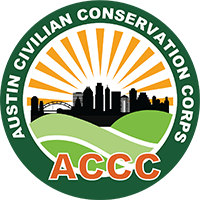
About ACCC
Austin Civilian Conservation Corps (ACCC) is a workforce development program that prepares young adults for careers in the environmental sector.
Created in 2020, the program is inspired by the 1930s Civilian Conservation Corps (CCC) initiative and prioritizes working with communities most impacted by extreme weather and accelerations in climate.
Overview
Austin Civilian Conservation Corps is a collaborative program that creates and supports pathways into employment and connects mission-aligned networks to form a larger collective, shaping Austin’s green workforce.
Through programming, ACCC works to solve workforce gaps, develop leadership potential, and create clearer pathways into full-time employment. With a “reciprocal cultural change model,” ACCC members gain experience and can support positive change in the program’s policy and practices.
- ACCC Vision
-
We model a transformed work culture in which we,
- Care for ourselves, others, and the planet;
- Support leadership that represents the communities we live in and collaborate with;
- Adapt to changing circumstances and address the most pressing environmental and social challenges, such as climate change and displacement
- ACCC Mission
-
Prioritize equity in green workforce development. Expand the narrative of green vocations.
- Examine and shape change in work cultures;
- Build more equitable pathways to employment, organizational leadership, and entrepreneurship;
- Strengthen networks of support for those most impacted by a changing climate;
- Cultivate and fairly compensate the next generation of leaders;
- Invest in people and projects that have a direct impact on climate justice
Explore Our Pathways
Our pathways are collaboratively designed to offer concentrations across various themes in the green sector. We work with local, regional, and national organizations to develop programs that support skills in environmental education and leadership.
Some of our past pathways include Digital Media & Communications, Recreation, Museum, Arts & Culture, and Zero Waste.
Natural Systems
This pathway is supported by three contracts with American Youthworks, Hungry Hill Foundation, and Austin Youth River Watch.
Aligned with the City’s Climate Equity Plan and Department Land Management Plan, this pathway focuses on protecting critical ecosystem services while gaining experience in forestry, land management, and green stormwater infrastructure.
Members work with other City departments to complete projects on preserves and parkland.
The Natural Systems Pathway is composed of two teams: ACCC Crews, facilitated by American YouthWorks, and a pilot group by Hungry Hill Foundation.
- ACCC Crews
-
ACCC Crews, facilitated by American YouthWorks, engages multiple groups to provide hands-on training, professional development, support services, resource, and job placement assistance.
Training includes restoration, erosion control, integrated pest and invasive species management, forest health maintenance, wildfire fuel mitigation, and trail and fence construction in parks, preserves and public land.
- Hungry Hill Foundation Pilot
-
Hungry Hill Foundation supports East Austin residents on their journey from unhoused to self-sufficient citizens through a holistic, multi-tiered work and apprenticeship program. They seek to establish Hungry Hill Foundation as a new and more effective model for addressing long-term homelessness that can be replicated.
ACCC supports Hungry Hill to sustain programming that exposes and trains Hungry Hill clients with conservation skills, knowledge, and experience to further work opportunities.
Former Teams
- ACCC Core Team
-
The Natural Systems Core Team consisted of temporary City employees and full-time collaborators focusing on forestry, land management, and infrastructure. Past partners included Urban Forestry units and Austin Department Services Youth.
- Forestry and Land Management (View Story Map)
- Green Stormwater Infrastructure (View Story Map)
- Watch Employment Track Videos
Research and Reports
This report provides historical context to workforce development and provides recommendations to reduce barriers for participants.
Key takeaways:
- Offer sick leave and paid time off
- Strengthen job placement support
- Build more relationships with community organizations
- Offer more programs based on interest
- Implement case management and make career advancement a structured part of the program
- Include representative program participants and members of the targeted community in planning meetings
- Ensure that program leadership should be able to relate to the population served
- Collaborate with program partners to re-evaluate their roles in the program
Presenting a systems map of economic conditions facing Austin communities from multi-level drivers, this report provides a framework to better inform program design to center equity and address community workforce needs.
Goals of this report:
- Define core elements of the problem(s) being addressed by ACCC (community sustainability, employment, workforce development).
- Define and explore relationships between elements within the current employment system that serves the ACCC’s target audience.
- Prioritize key points to make ACCC more effective
This report assists with future analysis of workforce sectors for green job growth. This study includes a photo-voice research methodology to gather first-hand experiences of ACCC members in the field to help inform programmatic design.
Get Involved
To learn about the Austin Civilian Conservation Corps (ACCC) program, contact program staff.

